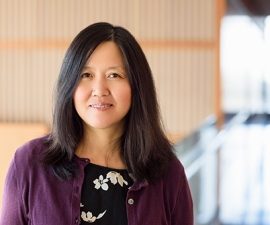

Research Bio
Lin He is the Thomas and Stacey Siebel Distinguished Chair professor and a professor in MCB department. Lin He is also a Biohub investigator in Chan-Zuckerberg Initiative.
While proteins are the structural and functional unit of living cells, only ~2% of mammalian genome contains protein-coding elements. It is increasingly clear that the ~98% mammalian genome has no protein-coding capacity, yet generates numerous non-protein-coding elements that regulate key biological processes. The He lab aims to elucidate the biological functions and molecular regulation of non-coding elements in mammalian development and disease, including miRNAs, long ncRNAs and transposable elements. Using an interdisciplinary approach combining mouse genetics and genomics, comparative genomics, cell and molecular biology, the He lab has elucidated an intricate crosstalk among non-coding RNAs, transposons and protein coding genes at the heart of the molecular regulation of key biological processes.
In contrast to the 2% mammalian genome that encode protein genes, nearly 40% mammalian genome originates from transposons. Transposons are a class of foreign sequences that hijack the host cellular machineries to invade, integrate and spread into the host genome. Transposons are traditionally viewed as parasitic invaders, and the vast majority are inactivated via degenerative mutations or transcriptional silencing. While most transposons are detrimental or neutral for the host, a subset of transposons are domesticated, and are employed by the host genome for gene regulation, genome innovation and genome stability. The co-opted transposons could alter gene expression regulation, modify gene coding structure and provide new protein-coding elements, substantially expanding the gene regulatory modality and transcript diversity in the host genome. Using genetics, genomics, computational biology, cell and molecular biology, the He lab will will elucidate the roles of transposons in reproductive aging and early embryogenesis.
Research Expertise and Interest
comparative genomics, developmental biology, cell biology, cancer biology



